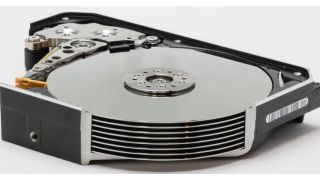Western Digital faces class-action suits over SMR hard drives
US law firm begins plaintiff solicitation against hard drive maker

Hattis & Lukacs, a US law firm specialising in class-action and consumer law, has revealed it has initiated solicitation of plaintiffs for a prospective class-action lawsuit against Western Digital.
According to the firm, WD failed to divulge in its marketing collaterals and product specifications that many of its hard drives use the Shingled Magnetic Recording (SMR) technology, which has been found to slow down hard drive performance.
SMR entails overlapping recording tracks on a hard drive in a bid to slash manufacturing costs and ramp up hard drive capacity.
- Best wireless drives 2020: external hard drives without the wires
- Incredible 8TB SSD is the largest laptop hard drive in the world
- The largest available hard disk is still a 16TB drive
Urging all buyers of the affected products, which includes a range of WD Blue and Black drives, to submit their names, Hattis & Lukacs alleged that the former’s customers have been complaining of “drastically slower write performance and storage failures”, particularly when deployed in RAID configurations. Hattis & Lukacs has earlier won settlements against McAfee and TracFone.
WD apology
It has also emerged that another firm, Slater Vecchio, has set in motion a lawsuit against WD in Canada, signalling that the company could potentially face a large number of similar class actions worldwide.
WD, which switched from the standard Conventional Magnetic Recording (CMR) technology to SRM for some of its offerings, has issued an apology to its customers. In a conciliatory move, the company has made public the names of all its hard drives that used SMR without prior disclosure.
The development comes in the wake of recent reports that showed SMR drives clocking slower speeds in executing various workloads, as compared to CMR ones. For instance, it takes between 13 and 16 times longer to execute the rebuild of a failed array for a four-drive RAID array driven by WD Red NAS HDDs with SMR. This shows that SMR drives can render data at risk for far longer than their CMR counterparts, a vital aspect considering that WD markets the WD Red NAS drives for RAID arrays.
Are you a pro? Subscribe to our newsletter
Sign up to the TechRadar Pro newsletter to get all the top news, opinion, features and guidance your business needs to succeed!
Tom’s Hardware had reached out to WD to inquire about reports that the storage equipment manufacturer was replacing SMR drives with CMR ones for some affected customers, with the company confirming the reports, saying that it responds to “product replacement requests” on a “case-by-case basis”.
In a related development, Toshiba and Seagate, which are also believed to have not disclosed their SMR adoption practices to customers, have now made public a comprehensive list of impacted drives.
- Best external hard drives of 2020
Via: TomsHardware
Jitendra has been working in the Internet Industry for the last 7 years now and has written about a wide range of topics including gadgets, smartphones, reviews, games, software, apps, deep tech, AI, and consumer electronics.

HP launched a very promising ultra portable XPS13 killer laptop — the 1kg EliteBook 635 Aero G11 is only available in Japan with seemingly no plans for a global launch, but why?

Intel finally brings its latest laptop CPU tech to other platforms but desktop users are shunned — Meteor Lake-PS architecture fuses Core Ultra and LGA socket, targets edge systems instead
Most Popular


